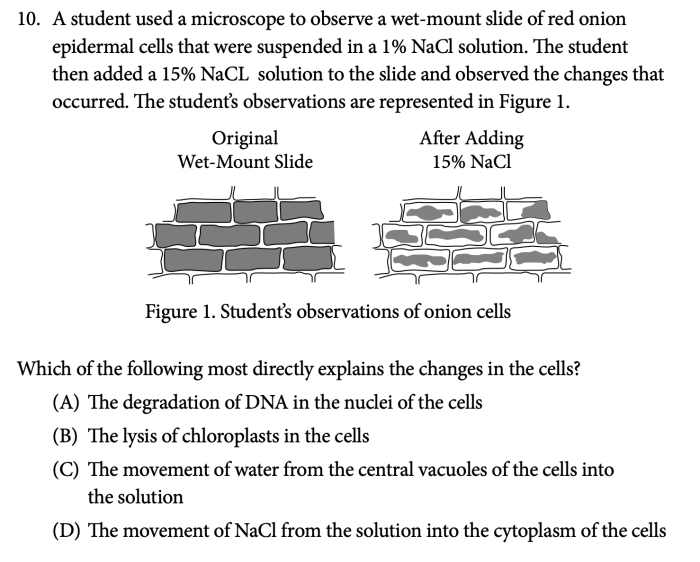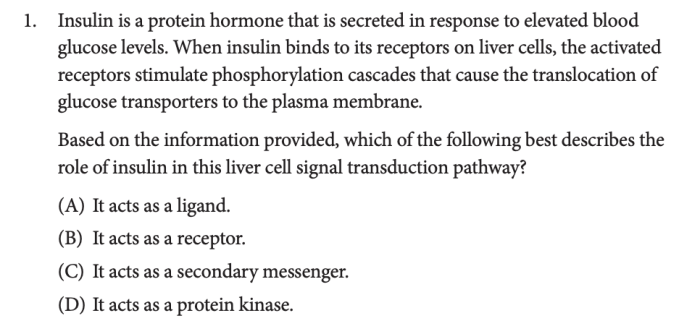Ap bio unit 1 mcq practice – Embark on a captivating journey through the fundamentals of AP Biology with our comprehensive MCQ practice guide. Dive into the intricacies of life’s characteristics, unravel the mysteries of cell structure and function, and witness the dance of energy transformations. Prepare to conquer the AP Biology exam with confidence!
Our meticulously crafted practice questions mirror the official College Board format, ensuring you’re well-equipped to tackle the exam head-on. Analyze key concepts, design experiments, interpret data, and master effective test-taking strategies. With AP Bio Unit 1 MCQ Practice as your guide, success awaits!
AP Biology Unit 1 Overview

AP Biology Unit 1 lays the groundwork for understanding the fundamental principles of biology, encompassing the study of life’s chemistry, cells, and genetics. It provides a comprehensive foundation for students to delve into more complex biological concepts in subsequent units.
Scope of Unit 1
Unit 1 encompasses a broad range of topics, including:
- The nature of science and its methods
- The basic chemistry of life, including the structure and function of biological molecules
- The structure and function of cells, the fundamental units of life
- The principles of Mendelian genetics and their applications in heredity
MCQ Practice Questions

Practice makes perfect! To enhance your preparation for the AP Biology exam, engaging in multiple-choice practice questions is essential. These questions will provide you with a comprehensive review of the Unit 1 curriculum and familiarize you with the exam format.
The practice questions are meticulously aligned with the College Board’s AP Biology exam specifications, ensuring that you encounter questions that mirror the actual exam. By tackling these questions, you can identify areas where you excel and pinpoint topics that require further attention.
Cell Structure and Function
Mastering the intricacies of cell structure and function is paramount for comprehending the fundamental principles of biology. Practice questions will assess your understanding of:
- The composition and organization of eukaryotic and prokaryotic cells
- The functions of various cellular organelles, such as the nucleus, ribosomes, and mitochondria
- The mechanisms of cellular transport, including diffusion, osmosis, and active transport
Cell Membranes
Cell membranes play a pivotal role in regulating cellular interactions and maintaining homeostasis. Practice questions will delve into:
- The structure and composition of cell membranes
- The principles of membrane transport, including passive and active transport
- The role of cell membranes in cell signaling and communication
Bioenergetics, Ap bio unit 1 mcq practice
Understanding the principles of bioenergetics is crucial for comprehending the energy flow within living organisms. Practice questions will cover:
- The laws of thermodynamics and their application to biological systems
- The mechanisms of cellular respiration, including glycolysis, the Krebs cycle, and oxidative phosphorylation
- The role of ATP as the primary energy currency of cells
Cell Cycle
The cell cycle encompasses the intricate processes involved in cell growth and division. Practice questions will focus on:
- The stages of the cell cycle, including interphase, mitosis, and cytokinesis
- The mechanisms regulating cell cycle progression
- The consequences of cell cycle dysregulation
Meiosis
Meiosis is a specialized cell division process essential for sexual reproduction. Practice questions will explore:
- The stages of meiosis, including meiosis I and meiosis II
- The mechanisms of genetic recombination during meiosis
- The significance of meiosis in maintaining genetic diversity
Concept Analysis

Unit 1 of AP Biology introduces fundamental concepts that form the basis of biological understanding. These concepts include the characteristics of life, the structure and function of cells, and energy transformations. By analyzing these key concepts, students gain a comprehensive foundation for further exploration in biology.
Working on your AP Bio Unit 1 MCQ practice? Take a break and try our challenging name on a spine crossword . It’s a fun way to test your knowledge of anatomical structures. Then, come back refreshed and ready to conquer those MCQs!
Characteristics of Life
Living organisms exhibit a unique set of characteristics that distinguish them from non-living matter. These characteristics include organization, metabolism, responsiveness, growth, reproduction, and adaptation.
- Organization:Living organisms are highly organized, with complex structures ranging from molecules to cells to entire organisms.
- Metabolism:Living organisms use chemical reactions to obtain and release energy, a process known as metabolism.
- Responsiveness:Living organisms can detect and respond to stimuli in their environment.
- Growth:Living organisms increase in size and complexity over time.
- Reproduction:Living organisms produce offspring that are similar to themselves.
- Adaptation:Living organisms evolve over time to become better suited to their environment.
Cell Structure and Function
Cells are the basic unit of life. They are composed of various organelles that perform specific functions. Understanding cell structure and function is essential for comprehending biological processes.
- Cell Membrane:The cell membrane is a semipermeable barrier that surrounds the cell and regulates the movement of substances in and out.
- Cytoplasm:The cytoplasm is the gel-like substance that fills the cell and contains various organelles.
- Nucleus:The nucleus is the control center of the cell and contains the cell’s DNA.
- Ribosomes:Ribosomes are responsible for protein synthesis.
- Mitochondria:Mitochondria are the powerhouses of the cell and produce energy.
- Endoplasmic Reticulum:The endoplasmic reticulum is involved in protein synthesis and lipid metabolism.
- Golgi Apparatus:The Golgi apparatus modifies and packages proteins and lipids.
Energy Transformations
Energy is essential for life, and organisms obtain energy through various processes. Understanding energy transformations is crucial for comprehending how organisms function.
- Photosynthesis:Plants use sunlight to convert carbon dioxide and water into glucose, releasing oxygen as a byproduct.
- Cellular Respiration:Organisms use oxygen to break down glucose, releasing energy in the form of ATP.
- Fermentation:Some organisms can break down glucose without using oxygen, a process known as fermentation.
Experimental Design

Conducting well-designed experiments is crucial in biological research. In this section, we will delve into the principles of experimental design and provide step-by-step guidelines for investigating biological phenomena covered in Unit 1.
Hypothesis Testing
The cornerstone of experimental design is hypothesis testing. A hypothesis is a testable prediction about the relationship between two or more variables. To test a hypothesis, we design experiments that allow us to collect data and determine whether the results support or refute the hypothesis.
- Null Hypothesis (H0):The hypothesis that states there is no significant difference or relationship between the variables being tested.
- Alternative Hypothesis (Ha):The hypothesis that states there is a significant difference or relationship between the variables being tested.
Variables
Variables are the factors that we manipulate or measure in an experiment. There are three main types of variables:
- Independent Variable:The variable that is manipulated or changed by the experimenter.
- Dependent Variable:The variable that is measured or observed in response to the changes in the independent variable.
- Controlled Variables:The variables that are kept constant throughout the experiment to ensure that they do not affect the results.
Data Interpretation

Data interpretation is a crucial skill in AP Biology. It involves analyzing and drawing conclusions from experimental data. This section provides sample data sets and guidance on interpreting and drawing conclusions.
Data interpretation involves identifying patterns, trends, and relationships in the data. It requires an understanding of the experimental design and the variables being measured.
Sample Data Set 1: Effect of Temperature on Enzyme Activity
- Temperature (°C): 10, 20, 30, 40, 50
- Enzyme Activity (arbitrary units): 10, 25, 40, 55, 30
Interpretation:The data shows that enzyme activity increases as temperature increases from 10°C to 40°C. However, it decreases at 50°C, suggesting that the enzyme is denatured at high temperatures.
Sample Data Set 2: Effect of Substrate Concentration on Reaction Rate
- Substrate Concentration (mM): 0.1, 0.2, 0.4, 0.8, 1.6
- Reaction Rate (arbitrary units): 10, 20, 30, 40, 50
Interpretation:The data shows a linear relationship between substrate concentration and reaction rate. This suggests that the reaction is substrate-limited, meaning that the rate of reaction is determined by the availability of substrate.
Test-Taking Strategies: Ap Bio Unit 1 Mcq Practice

Succeeding in AP Biology MCQ exams requires strategic preparation. Here are some effective techniques to maximize your performance:
Time Management
- Allocate time wisely: Determine the average time per question and stick to it.
- Prioritize questions: Focus on questions you can answer quickly and confidently first.
- Skip difficult questions: Don’t waste time on questions you’re unsure about. Mark them for later review.
- Use extra time: If you finish early, use the remaining time to review your answers or attempt the more challenging questions.
Question Analysis
- Read the question carefully: Understand the specific information being asked.
- Identify s: Highlight important terms that provide clues to the answer.
- Eliminate obviously wrong answers: Cross out choices that are clearly incorrect.
- Consider all options: Don’t jump to conclusions; evaluate each answer choice carefully.
Answer Selection
- Choose the best answer: Select the option that most accurately and completely answers the question.
- Be aware of common distractors: Recognize and avoid misleading or irrelevant answer choices.
- Trust your instincts: If you’re unsure, go with the answer that feels most logical.
- Don’t overthink: Sometimes, the simplest answer is the correct one.
FAQ Insights
What is the scope of AP Biology Unit 1?
Unit 1 lays the foundation for AP Biology, covering the fundamental principles of life, cell structure and function, and energy transformations.
How do I access the MCQ practice questions?
The practice questions are embedded within the guide, providing you with ample opportunities to test your understanding.
What is the benefit of analyzing key concepts?
Analyzing key concepts deepens your comprehension and helps you connect the dots between different biological processes.